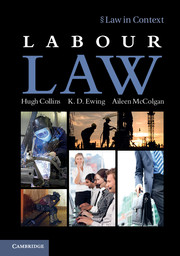Book contents
- Frontmatter
- Contents
- Preface
- Acknowledgments
- Table of cases
- Table of statutes
- Table of statutory instruments
- Table of European Union instruments
- Table of ILO instruments
- Table of other international instruments
- Abbreviations
- Part I Introduction
- Part II The contract of employment
- Part III Statutory regulation of the employment relationship
- Part IV Collective labour rights
- Part V Termination of employment
- 18 Wrongful dismissal
- 19 Unfair dismissal
- 20 Economic dismissal
- Index
- References
20 - Economic dismissal
from Part V - Termination of employment
- Frontmatter
- Contents
- Preface
- Acknowledgments
- Table of cases
- Table of statutes
- Table of statutory instruments
- Table of European Union instruments
- Table of ILO instruments
- Table of other international instruments
- Abbreviations
- Part I Introduction
- Part II The contract of employment
- Part III Statutory regulation of the employment relationship
- Part IV Collective labour rights
- Part V Termination of employment
- 18 Wrongful dismissal
- 19 Unfair dismissal
- 20 Economic dismissal
- Index
- References
Summary
This chapter examines the legal protections afforded to workers in the event of managerial decisions that require major changes in the business. The employer may become insolvent, or the business may be sold to a new owner. Changing market conditions and technologies may force the employer to seek to reduce the number of employees, to alter their contractual terms or to recruit new staff with different skills. Most restructuring exercises aim to improve, at least in the short term, the profits and the value of shares in solvent and successful companies. Whatever the cause of the restructuring, it is likely to have a significant adverse impact on the number of jobs or the terms and conditions of employment. What legal rights do employees have in respect of these decisions, and are these rights adequate to protect their interests?
Competing policies
Legal regulation in this sphere has been shaped by three dominant policy considerations.
- Type
- Chapter
- Information
- Labour Law , pp. 857 - 906Publisher: Cambridge University PressPrint publication year: 2012



